This interview, conducted by Professor Kinema (Jim Knusch) with actor Jeff Morrow, originally appeared in Psychotronic Video magazine (Fall, 1993). Professor Kinema expands on his article for Zombos' Closet. Photos and illustrations are from Professor Kinema's archives.
Jim: The second movie on your Universal contract was Captain Lightfoot.
Jeff: Yes, that was shot on location, being set on a little Irish seacoast town. In the appropriate roles local actors were utilized. I played a pleasant Roman gentleman. The one element of working on location I remember was the sight of the poor Irish children I observed early in the morning picking through the garbage. However, all involved made it a pleasant experience.
Jeff Morrow next appeared in World in My Corner (1956) with Audie Murphy and The First Texan (1956) with Joel McCrea playing Sam Houston. Pardners (1956) came next. This ironically titled film featured Dean Martin and Jerry Lewis who were to make one more feature, Hollywood or Bust, before breaking up completely.
Jim: Was it, sort of, a solid rumor that Martin and Lewis were on the road to breaking as a team during the making of Pardners?"
Jeff: Yes, I believe so. I remember Jerry Lewis would occasionally go a little wacky on the set, in front of and behind the camera. He had a habit of trying to distract off-camera. In Pardners I had a bar room fight scene. I remember Jerry Lewis being knocked into a dark closet and suddenly emerging an excellent fighter (as Dean Martin).
Jim: Also that year, 1956, came the third Creature film, The Creature Walks Among Us. This was the last of the series, the only one not filmed in 3D. Also, it was the only film in the series in which the creature doesn't die at the end.
Jeff: Yes, that's right. I hadn't seen the previous two Creature films but I was aware of them. My Universal contract was still in effect and there wasn't another film property that they could use me in at the time. It wasn't a bad script and I made the most of it.
Jim: Significantly, you were teamed with This Island Earth co-star Rex Reason. Do you have any recollections of any of the others in the cast?
Jeff: Leigh Snowden, I thought, was a beautiful ingénue. I remember there were both Ricou Browning and Don Megowen as the Creature, in and out of the water.
Jim: Yes, I believe that was the case in the first two Creature films. In the water the Creature moved with a balletic grace as he glided through the clear waters of the Black Lagoon. Once he is confronted on land it takes on the personality of the lumbering beast.
Jeff: I thought the Creature costume, both before and after the burning incident, was convincing. There was a scene that takes place on a balcony where I was being pursued by the Creature. He picks me up to toss me over. In the final cut a dummy goes over, yet for a moment before the director yelled "Cut!" I thought I was going over for real.
Jim: Were there any locations other than the back lot used during production?
Jeff: No, we never left Hollywood. I remember the scene where the Creature was set on fire was shot on one particular night when we were working quite late.
Jim: The next year, 1957, you appeared in two sci-fi- films,Kronos and The Giant Claw. Both films were produced on low budgets, both were concerned with a giant alien menace who possessed a powerful other-worldly power. Kronos, however, was relatively well made and possessed a sound scientific premise while The Giant Claw is generally regarded as one of the prime turkeys of the 1950s.
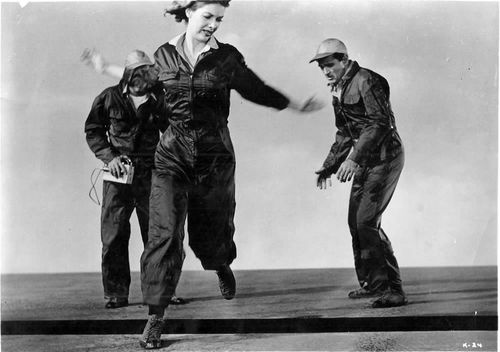
Jeff: (Laughing) Yes, that's unfortunately true. The Giant Claw seemed to initially have a sensible premise as well as a good storyline. The concept of antimatter was a plausible scientific theory at the time and attempting to depict it on the screen wasn't far beyond the realm of believability. We were told that the giant bird was supposed to be a sort of streamlined hawk that could travel at supersonic speeds. We weren't shown any sketches of it. The first time I saw the film I was in a theater with friends, I believe, in Westwood. During the screening all was going well until that big bird first appeared on the screen. The audience was howling. Every time it reappeared I just sank lower and lower into my seat. Whenever I attended a film that I appeared in with family and friends it was customary to gather in the lobby and discuss it afterwards. In the case of The Giant Claw I couldn't face anyone and discretely slipped out one of the rear exits.
Jim: Well, I'm sure that no one in attendance thought that you, the star of the film, was responsible for the less than stellar special effects?
Jeff: No, no one did, but still it was embarrassing.
Jim: Yet films like The Giant Claw prove to be as fondly remembered as the larger and more prestigious productions like This Island Earth.
Jeff: Yes, I believe so. At the time we hoped that such films like The Giant Claw would run their course and quietly fade into oblivion, never to be seen again.
Jim: Well, and I say this as an aficionado of bad films, fortunately they do surface and find new audiences who view and even cherish them with different sensibilities. Do you have any memories of Kronos ?
Jeff: Yes, I believe we worked on that for about four weeks. Again, because of the limited budget, the special effects couldn't live up to the potentials of the premise of the story.
Jim: Yet, visuals of a gigantic rampaging simplistically designed automaton from outer space was easier to ingest than a gigantic buzzard from outer space - with flaring nostrils, no less. However, one interesting fact is that the story of Kronos was concocted by special effects artists Irving Block and Jack Rabin. Block worked on Forbidden Planet (1956) and the team worked on films like The Invisible Boy, Roger Corman's Viking Women and the Sea Serpent, War of the Satellites, and The Thirty Foot Bride of Candy Rock, Lou Costello's final film.
Jeff: Anyway, with Kronos I wasn't compelled to quietly slink out of the back door of a movie theater after my initial viewing of it. I enjoyed working with Kurt Neuman, co-players Barbara Lawrence, George O'Hanlon, and Morris Ankrum. I had worked with Morris on The Giant Claw and found him...being old. John Emery was an old friend. We both appeared in a New York stage production of Saint Joan.
Jeff Morrow's next several screen appearances ranged from big budget large screen productions like The Story of Ruth (1960) (reuniting him with The Robe director Henry Kosher) and smaller productions like Harbor Lights (1963) (in which the title doesn't have the remotest connection with the story.). Also appearing on television he helped build Union Pacific (as star of the series), was in residency in The New Temperature's Rising, and guested on several other major series. In Rod Serling's The Twilight Zone he appeared in a memorable episode titled Elegy (written by Charles Beaumont and aired 2/19/60). In it he is one of three astronauts who find themselves on a strange planet where people are frozen amidst various settings. They eventually meet a kindly old gentleman who turns out to be the caretaker of what they find out--too late--that the planet is a cemetery.
Jim: Do you have any memories of The Twilight Zone episode, Elegy?
Jeff: Like it was, working in virtually all television production of the time, the shooting schedule was rushed. My co-stars were Don Dubbins, Kevin Hagen and Cecil Kellaway. What I remember most about Cecil was of him being sly. When he was off camera he was always doing something to distract whoever was on camera. Also, when he was in a scene with other performers he was busy doing some sort of business so that he would dominate the action in the scene.
Jim: Do you have any memories of Rod Serling?
Jeff: He was a real friendly and talented person. He wasn't too actively connected with Elegy while it was being shot. We were all genuinely saddened when he died so young.
Jim: Now the last two film titles I have to ask you about are Legacy of Blood from 1971 and Octaman from 1973.
Jeff: Like The Giant Claw and Copper Sky earlier in my career, my agent tells me to do it, Legacy of Blood, take the money and run. No one will see it and it should be quickly forgotten. The only significant element of Legacy of Blood would be is that I was reunited with Faith Domergue. I don't consider it one of my better efforts at all. On bad nights I would probably have a nightmare about it. With Octaman I was a friend of the screenwriter, Leigh Chapman, and the director, Harry Essex (a writer of the first Creature film) who asked me as a personal favor to appear in what amounted to little more than a cameo. I worked for three days and was in a short scene with Kerwin Mathews. The other leading player was Pier Angeli, who committed suicide during production, I believe.
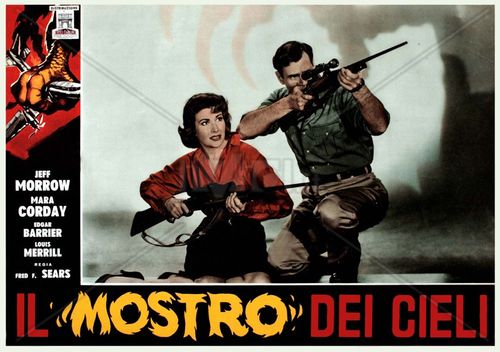
Jim: For the record, the official reason for her taking her own life was that she couldn't face life after the age of 40. Did you encounter the young Rick Baker who created the Octaman at all?
Jeff: I had little to do with him in the three days I worked on the picture. I remember Octaman looking a bit on the silly side. It's fortunate, though, that Rick continued to persevere and go on to create some fabulous makeups and win awards.
Jim: Do you stay in touch with any of the people that you've worked with? What of Rex Reason and Faith Domergue?
Jeff: No, I haven't been in touch with Rex and Faith in recent years. Rex, I believe, went into real estate. He had stayed active in TV doing guest shots in various series and commercials for a while. His brother Rhodes Reason I know stayed professionally active. Faith? I lost contact with her. The last I heard was that she was moving to Italy.
Faith Domergue did in fact live and make a few films in Italy in the 1960s and 1970s. She passed away on April 4 1999 in Santa Barbara, age 74.
Jim: Have you saved much from the old days?
Jeff: I have photos. When you work on the stage and in movies you have many photos that have been made up for promotion and publicity purposes. I also have many posters. Unfortunately I don't have the wall space to display them.
Jim: You've also had a career as a commercial artist?
Jeff: About 95 percent of all who work as a performer have some sort of back up work that pays the bills in between acting jobs. I've done illustrations for magazines, technical drawings, organizational charts, progressive charts, flow charts. That kind of work.
Jim: In the MagicImage Filmbook of This Island Earth there is an excellent rendering of yourself as Exeter by you. What have you been doing these days?
Jeff: My wife, Anna Karen, who was an actress, started a real estate business about eight or nine years ago. Being a member of the Academy [of Motion Picture Arts and Sciences] we attend many screenings of current films throughout the year and generally stay in with the film folk.
Jeff Morrow passed away Dec 26, 1993 in his home in Canoga park at the age of 86.
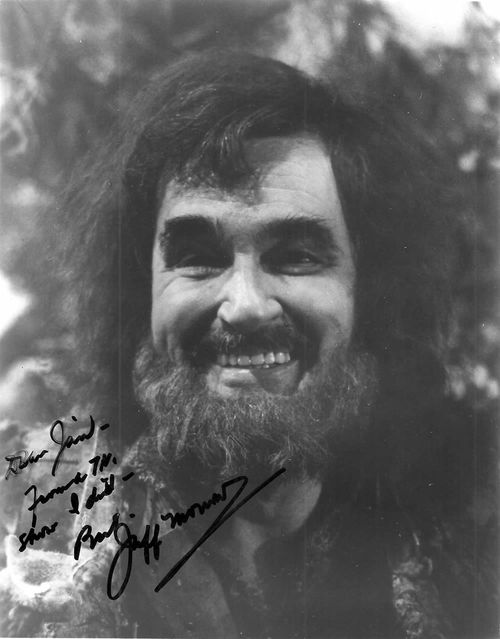
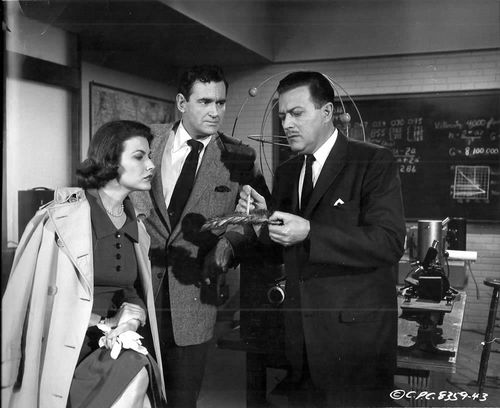
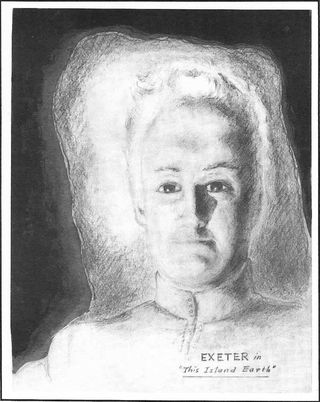



Comments